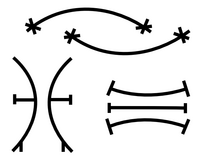Ibibio people

|
|
| Total population | |
|---|---|
| Over 5 million | |
| Regions with significant populations | |
|
|
|
|
|
46,000 |
|
|
39,000 |
|
|
2,700 |
|
(Afro-Trinidadian and Tobagonian) |
371 (1813) |
| Languages | |
| Ibibio, English | |
| Religion | |
| Christianity, traditional, | |
| Related ethnic groups | |
| Efik, Anaang, Ejagham, Oron, Igbo, Ijaw | |
The Ibibio people are from southwest Nigeria. They are related to the Anaang and Efik peoples. During colonial period in Nigeria, the Ibibio Union asked for recognition by the British as a sovereign nation (Noah, 1988). The Annang, Efik, Ekid, Oron and Ibeno share personal names, culture, and traditions with the Ibibio, and speak closely related varieties of Ibibio-Efik which are more or less mutually intelligble.
The Ibibio people are found predominantly in Akwa Ibom state and is made up of the related Anaang community, the Ibibio community and the Eket and Oron Communities, although other groups usually understand the Ibibio language. Because of the larger population of the Ibibio people, they hold political control over Akwa-Ibom State, but government is shared with the Anaangs, Eket and Oron. The political system follows the traditional method of consensus. Even though elections are held, practically, the political leaders are pre-discussed in a manner that is benefiting to all.
The Ibibio people are located in Southeastern Nigeria also known as Coastal Southeastern Nigeria. Prior to the existence of Nigeria as a nation, the Ibibio people were self-governed. The Ibibio people became a part of the Eastern Nigeria of Nigeria under British colonial rule. During the Nigerian Civil War, the Eastern region was split into three states. Southeastern State of Nigeria was where the Ibibio were located, one of the original twelve states of Nigeria) after Nigerian independence. The Efik, Anaang, Oron, Eket and their brothers and sisters of the Ogoja District, were also in the Southeastern State. The state (Southeastern State) was later renamed Cross Rivers State. On 23 September 1987, by Military Decree No.24, Akwa Ibom State was carved out of the then Cross Rivers State as a separate state. Cross Rivers State remains as one of neighbouring states.
...
Wikipedia
